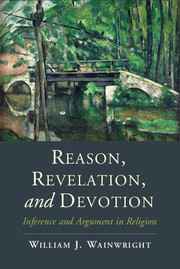Book contents
- Frontmatter
- Dedication
- Contents
- Acknowledgments
- Introduction
- 1 Four Examples of Religious Reasoning
- 2 The Purposes of Argument and the Person-Relativity of Proofs
- 3 Religious Reading and Theological Argument
- 4 Passional Reasoning
- 5 The Role of Rhetoric in Religious Argumentation
- 6 Reason, Revelation, and Religious Argumentation
- 7 Theology and Mystery
- Conclusion
- Notes
- Index
6 - Reason, Revelation, and Religious Argumentation
Published online by Cambridge University Press: 05 December 2015
- Frontmatter
- Dedication
- Contents
- Acknowledgments
- Introduction
- 1 Four Examples of Religious Reasoning
- 2 The Purposes of Argument and the Person-Relativity of Proofs
- 3 Religious Reading and Theological Argument
- 4 Passional Reasoning
- 5 The Role of Rhetoric in Religious Argumentation
- 6 Reason, Revelation, and Religious Argumentation
- 7 Theology and Mystery
- Conclusion
- Notes
- Index
Summary
The anti-Pelagian arguments of Augustine discussed in Chapter 1 rely heavily on appeals to Christian scriptures. They are not the only proofs discussed in that chapter that do so, however. Peter Geach thinks that being omnipotent (being able to do all things) should be distinguished from being almighty (having power over all things), and claims that although the former is arguably incoherent, being almighty must be ascribed to God to ensure that the powers of darkness will ultimately be defeated. He concedes, though, that while a belief in God's ultimate triumph is essential to traditional Christian belief, its truth can be established only by an appeal to revelation – not by philosophical argumentation. Again, one of Ramanuja's objections to Advaita Vedanta is that their denial of the reality of distinctions undercuts Advaita's appeal to the Vedas, which both he and the Advaitins believe to be an inerrant revealed text.
Chapter 3 argued that religious reading inflects the construction and appreciation of religious arguments in the major religious traditions. For their influence to be epistemically benign, however, the relevant texts must be truthful. Now many if not most of the texts in which the religious intellectuals of these traditions are immersed are thought to be revealed texts. If they really are revealed, then presumably they are truthful. Yet are the alleged revelations authentic?
The question of revelation comes up in Chapter 5 as well. The unstated but implicitly assumed presuppositions of the religious rhetorician's enthymatic arguments are often allegedly revealed truths. So if the rhetorician's arguments are to carry their full weight, the revelations must be authentic.
Do the appeals to reason in these cases therefore have a limit? Or can the appeal to revelation itself be rational?
Vedantin and Christian Views of Revelation
Orthodox Hindus regard the Vedas as revealed texts. Vedanta believes that the Vedas are eternal. “Two kinds of eternity are distinguished…. A thing is kutastha nityata [immutably eternal] if is unchanged forever. A thing is pravaharupa nityata [mutably eternal]” if it exists for ever, changing incessantly but always according to the same pattern. (If the movements of our solar system were everlasting, they would therefore be said to be mutably eternal.) Shankara appears to have thought that the Vedas are mutably eternal, produced anew at the beginning of each world cycle according to the same unchanging pattern.
- Type
- Chapter
- Information
- Reason, Revelation, and DevotionInference and Argument in Religion, pp. 103 - 128Publisher: Cambridge University PressPrint publication year: 2015

